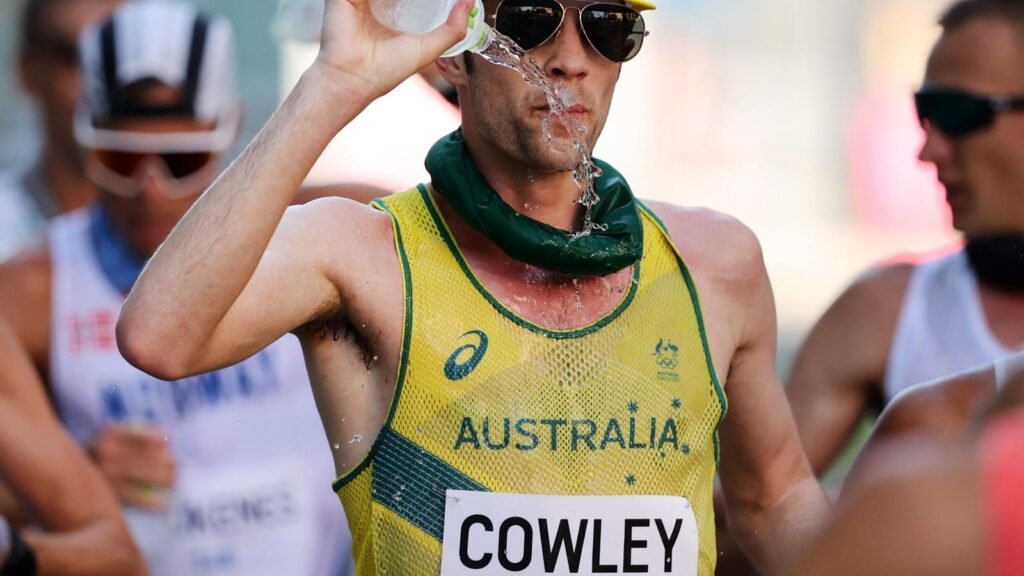India and Pakistan are experiencing record heatwaves of 50C/122C, Mexico’s heatwaves are heading towards the US, and even Finland, which sits just north of the Arctic Circle, is officially reporting a heatwave and experiencing wildfires.
France’s weather forecasting agency Météo France is already predicting higher than normal temperatures in the country between May and July. How will the 10,500 athletes and 300,000 spectators who arrive in Paris in July for the 2024 Olympics be supported in hot weather? Are the athletes prepared for that possibility?
People cool off in the Trocadero fountain next to the Eiffel Tower on July 23, 2019 in Paris. … [+]
The International Olympic Committee has been preparing for such an event, developing the “IOC Agreed Statement on Recommendations and Regulations for Sporting Events in Extreme Heat.”
Heat Recommendations
The health and safety of athletes during sporting events in hot weather is a top priority. Athletes should prepare for the expected environmental conditions and it is recommended that heat acclimatization will be important, especially in Paris. Athletes should manage their health prior to the event and plan hydration, cooling, warm-up and clothing according to the risks associated with the expected environmental conditions.
Local organizers will be expected to monitor and communicate environmental conditions prior to and during the event, provide sufficient ice and hydration, and suggest appropriate heat stress mitigation facilities such as shade and recovery areas.
Medical personnel at the Games should receive specific training in the management of exercise-related heat stroke, including early recognition and diagnosis, as well as the use of rapid whole-body cooling in situ, with the recommendation to “cool first, transport second”. International Federations are encouraged to develop their own environmental heat stroke protocols with clear communication pathways regarding the level of risk and associated measures.
This is not the first time
This is not the first time Olympic organisers have had to deal with the effects of heat. During the 2021 Tokyo Olympics, temperatures in the Japanese capital reached 34C/93F and humidity reached nearly 70%. Events due to take place during the hottest parts of the day have been rescheduled to earlier or later times, locations have been moved to seek cooler climates and mist stations have also been installed for added cooling. The BBC reported last year that “contingency plans are in place to adjust the schedule, but a Paris 2024 spokesman said there are no plans to change the location of any events.”
“Worst case scenario”
Race walker Rhydian Cowley will be competing in the 20km race walk as a member of the Australian team, making his third Olympic appearance. With the current heatwaves around the world and predictions that the summer will be hotter than usual, Rhydian said the following. ““I and all the other Australian hikers are preparing for the worst that could happen in Paris, which we know is becoming more likely with climate change. I’m in the middle of a training block now, doing heat acclimatisation sessions in a heat chamber several times a week.”
He continued: “I will incorporate post-training passive heat interventions during my altitude training in St Moritz in June, followed by further acclimatisation to the warmer climate in Montpellier during my final pre-Olympic conditioning camp. I will also be regularly implementing in-competition interventions such as pre-cooling, hyper-hydration protocols, as well as fuelling and cooling during the race, to maximise my readiness for the extreme heat.”
Sapporo, Japan – August 6: Australian team player Rhydian Cowley … [+]
“Knowing that heatwaves continue to become more likely and more extreme due to climate change, Australian race walkers understand that only by taking a holistic approach to racing in the heat, incorporating input from nutritionists and performance scientists, can they maximise their chances of performing safely at championship events. When championship events are held in the northern hemisphere summer, the risk of competing in the middle of a heatwave is at its peak, but this is a standard part of our preparation and is now culturally ingrained – it’s something we cannot afford to cut corners on from a performance or safety perspective.”
What about the audience?
Spectators, like volunteers and staff, may also be affected by heat. Paris 2024 organizers acknowledge this possibility for spectators in their ticket terms and conditions. Ticket holders must be aware and accept that attending the games “may involve certain inherent risks, dangers or hazards, including but not limited to the risk of transmission of COVID-19 or existing or future variants thereof or other communicable diseases, and exposure to heat.”
If you are attending the Paris 2024 Olympic Games or any sporting event this summer and want to protect yourself from the sun and heat, remember to apply a high SPF sunscreen, wear a hat, seek shade, cover up and wear loose-fitting clothing made from natural fibers. Drinking enough fluids to stay hydrated is crucial. Spectators will be allowed into all Paris 2024 venues with their own reusable bottles, except those made of glass or over 75cl in size, as a notable exception to existing French regulations, and drinking fountains will be provided free of charge throughout the venues.




